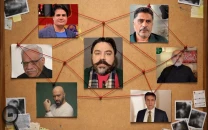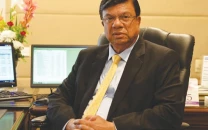Education: The PTI’s false promises won’t help
How will Imran Khan get agreement on single religious curriculum in an ideological state engulfed by religious strife?

Education: The PTI’s false promises won’t help
Painstakingly prepared by a professional team — and helped by 5,000 local volunteers — the ASER report covered 2,599 villages/blocks, 49,793 households, and 146,874 children. It confirms that Pakistani children find it difficult to read any language, or even to do simple arithmetic. Just 40.1 per cent of the 5-16 age group could do two-digit subtraction sums (with carry) whereas a mere 23.6 per cent were able to do three-digit division sums. Only 41.8 per cent could read a sentence in Urdu or their mother tongue (English is a far cry). Far fewer could read a story.
This saddens, but does not shock. About 25 years ago, deeply worried by the poor preparation of our incoming students, my colleagues at Quaid-e-Azam University and I sought to understand the causes and suggest remedies. Pakistan Television invited us to do a detailed 13-part TV documentary series that explored important aspects of education. In these nationally-viewed programmes, students and teachers came before our cameras, and we visually examined the curriculum, textbooks, teaching of history and science, teacher education, examinations, etc. Today, with much sadness, we learn from the ASER data that the situation has worsened over a quarter century, not improved. The question is: why?
To blame corruption and a particular government is easy but wrong. Many governments have come and gone without making much difference. Corruption, though widespread, is also not central. It has not prevented Pakistan from having reasonably good hospitals, a national airline that still manages to fly, and an ever-improving network of roads. No particular vision of the world (read, ideology) is needed for building roads. But for building education, and its institutions, it’s a different story.
Murray Gell-Mann, the famous physicist, described education as the “cultural DNA” which is transmitted between generations. As such, schooling is all about building minds for a future society. That society would, of course, have to have the desired normative values. So, here is the rub: the modern education needed for modern times cannot do without the ideology of progress. Pakistan’s failure to create a viable education system is not primarily because of poor administrative practices or corruption, but an idea system unsuited for modernisation. So when Imran Khan and the PTI proclaim that they are going to revolutionise education after rolling into power, one must first ask what they mean by ‘education’.
My first exposure to Khan’s vision was in 1996 when he convened a private meeting at his Lahore residence. He said he wanted our help to bring about an “education revolution” in Pakistan. Three of his six invitees were bearded maulanas. They agreed with the need for revolution, but declared that it could only happen through mosque schools and madrassas. During our noisy three-hour meeting, they ranted against the existing education system as a western conspiracy to secularise Pakistan. One maulana insisted that literacy was worthless without teaching “alif-se-Allah, bay-se-bandooq, jeem-se-jihad”.
The meeting was a total disaster. I was shocked that Mr Khan thought that such primitive views were worthy of discussion. He told me that it was necessary because we need to have these people on board for the greater good. Years later, one of his invitees, Maulana Ghulam Murtaza Malik, known for extreme sectarian views, was gunned down along with his armed guards by opponents when his Land Cruiser stopped at a traffic light.
One hopes that Chairman Khan has travelled some way since those days. But the signs are not reassuring. His recent autobiography tells us of an evangelical born-again, furiously raging against his “pukka brown sahib” education at Aitchison College and Oxford University. Like most repentant sinners, he is frequently inchoate and contradictory. For example, even as Khan calls for more technology he vehemently assaults the foundations of science and the scientific method. But pragmatism reigns in other places: somehow ‘seeing the light’ did not stop him from sending his children to those very elite schools which,he says, he now despises.
A public can learn to live with leaders with some personal contradictions, provided there are not too many. But what is one to make of Khan’s principal claim that he will introduce one standard curriculum and language for all Pakistani schools? This certainly appeals to all equalitarian sensibilities, and to a country split by an educational apartheid.
But, short of a miracle, this is impossible because Pakistanis live in non-overlapping parallel universes. Just how does Chairman Khan plan to get agreement on a single religious curriculum in an avowedly ideological state engulfed by bloody religious strife? Fix a single language of instruction in communities fiercely divided along ethnic and linguistic lines? Or make Beaconhouse school students in Karachi study the same materials as those in tribal Waziristan and rural Sindh? Now that Beaconhouse, a chain of high-end schools, is solidly represented in the PTI through Mr Khurshid Kasuri, this will be interesting to watch.
Instead of asking for the moon, Chairman Khan could serve the genuine interests of Pakistan were he to demand that its school system stop spreading sectarian and religious hatreds; stop viewing the people of other countries as their enemies; stop telling lies about our history; stop using wretchedly bad locally-written science and math textbooks; stop rewarding parrot-like memorisation in examinations; and stop tolerating widespread teacher absenteeism.
The PTI’s self-proclaimed ‘education tsunami’ is just a stomach rumble. It shall pass, but not without leaving a bad odor. Its youthful supporters, idealistic but naïve, are being led by the Pied Piper towards disillusionment and disappointment.
Pakistan desperately needs education that produces socially responsible, thoughtful, and well-informed individuals equipped with a mindset that can readily accept the country’s diversity of languages, cultures, and religions. The goal must include imparting a sufficient skill and knowledge level to enable employability and participation in a modern society. Imran Khan’s demagoguery will not deliver this.
Published in The Express Tribune, February 9th, 2012.














COMMENTS
Comments are moderated and generally will be posted if they are on-topic and not abusive.
For more information, please see our Comments FAQ